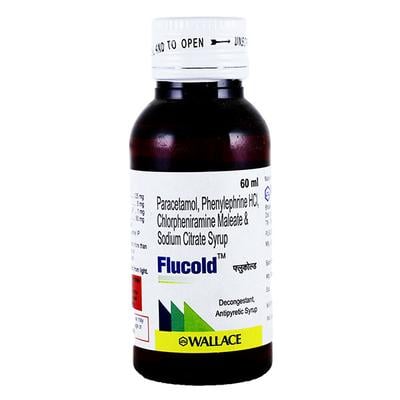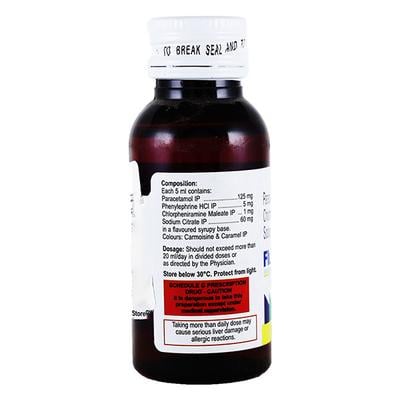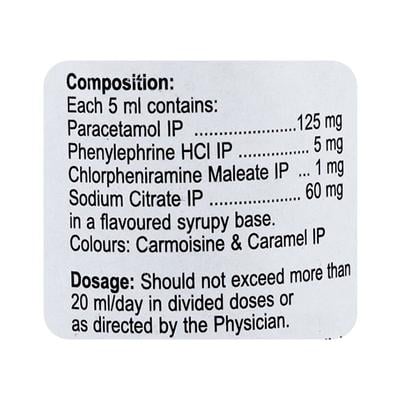

Netmeds First Membership
Quick Links
Introduction About FLUCOLD SYRUP
FLUCOLD SYRUP contains Chlorpheniramine maleate, Paracetamol, phenylephrine, and Sodium citrate which belong to the group of medicines called antihistamines, analgesics, nasal decongestants, and mucolytics respectively. It is used in children to manage and relieve symptoms of the common cold, cough, hay fever(seasonal allergy) and other respiratory conditions.
Symptoms of these diseases include a runny or blocked nose, sore throat, tonsillitis, sinus congestion, headache, fever, sinusitis, watering and itching of the eyes, sneezing, and middle ear infection (otitis media). FLUCOLD SYRUP is also used for the management of minor pains such as migraines, tooth pain, muscle aches, etc.
Before taking FLUCOLD SYRUP, inform your doctor if you are pregnant, breastfeeding, or have diseases like liver and kidney diseases, alcohol dependence, intolerance to any sugars, heart diseases, diabetes, thyroid disease, fit, closed-angle glaucoma (an eye disease with increased pressure inside the eyes that may lead to loss of vision), trouble urinating due to an enlarged prostate gland, etc.
FLUCOLD SYRUP is not recommended for use in patients with severe hypertension and asthma. FLUCOLD SYRUP should be used with caution in pregnant and breastfeeding women. FLUCOLD SYRUP should not be used in children under the age of four.
The most common side effects of taking FLUCOLD SYRUP include nausea, weakness, sedation, shaking, anxiety, difficulty sleeping, anxiety, tremor, etc. Consult your doctor if any of the symptoms are worsening.
Uses Of FLUCOLD SYRUP
Manages the symptoms of:
- common cold and hay fever (symptoms include includes red, itchy, watery eyes, sneezing, itchy nose, or throat, running nose or blocked nose, throat pain, dry cough etc.)
- cough
- sinusitis
- tonsilitis
- middle ear infection
- minor aches and pain such as tooth pain, back pain, mild arthritis (inflammation of joints), migraine
How FLUCOLD SYRUP Works
FLUCOLD SYRUP contains chlorpheniramine, paracetamol, phenylephrine, and sodium citrate. Chlorpheniramine is an antihistamine that blocks the effect of histamines (chemicals produced by the body in response to allergens) and manages the release of allergy-causing chemicals that are responsible for the symptoms of itching in the eyes, watery eyes, sneezing, running, or a blocked nose.
Paracetamol blocks chemical messengers in the brain that regulate pain and heat, thus helping to relieve fever and pain. Phenylephrine is a nasal decongestant that helps to increase sinus cavity drainage and relieve nasal congestion.
Sodium citrate is added to cough syrup as a mucolytic, which thins and loosens mucus, making it easier to cough out. Thus, FLUCOLD SYRUP helps to relieve the symptoms of a cold, cough, pain, and aches.
How to use FLUCOLD SYRUP
Take FLUCOLD SYRUP as advised by your physician. Shake well before use. FLUCOLD SYRUP is generally taken after food. Your doctor will decide the correct dose and duration for you depending on your age, body weight and disease condition.
Side Effects Of FLUCOLD SYRUP
Rare
Stop taking FLUCOLD SYRUP and contact your doctor immediately if you have:
- swelling on face, lips, mouth, and throat with difficulty in swallowing, and breathing accompanied by rashes or hives in body
- becoming tired, getting cold often, bleeding more than usual
- redness of the skin with rashes and blisters
- nervousness, dizziness, or sleeplessness
- symptoms do not improve within 7 days or are accompanied by fever
Warning & Precautions
Pregnancy
Use with CautionFLUCOLD SYRUP should be used with caution if you are pregnant or might be pregnant. A lower dose is generally recommended to use in pregnancy. Consult your doctor before taking it.
Breastfeeding
Use with CautionFLUCOLD SYRUP should be used with caution if you are breastfeeding as there is a chance for FLUCOLD SYRUP to pass through breast milk. Consult your doctor before taking FLUCOLD SYRUP.
Driving and Using Machines
Use with CautionDo not drive and operate any machines while taking FLUCOLD SYRUP as it can make you feel dizzier and drowsier. Consult your doctor before taking FLUCOLD SYRUP.
Alcohol
ContraindicatedDo not consume alcohol while taking FLUCOLD SYRUP to avoid unwanted side effects. Consult your doctor before taking FLUCOLD SYRUP.
Kidney
Use with CautionFLUCOLD SYRUP should be used with caution in patients with kidney diseases. (Difficulty to pass urine) Consult your doctor before taking it.
Liver
ContraindicatedFLUCOLD SYRUP is not recommended for patients diagnosed with serious liver diseases. Consult your doctor before taking it.
Allergy
ContraindicatedDo not take FLUCOLD SYRUP if you are allergic to chlorpheniramine maleate, paracetamol, phenylephrine, or sodium citrate. Consult your doctor before taking FLUCOLD SYRUP.
Lungs
Consult your doctorFLUCOLD SYRUP is not recommended to be used in patients suffering from asthma. FLUCOLD SYRUP should be used with caution in patients suffering from other breathing problems like bronchitis, and bronchiectasis. Consult your doctor before taking FLUCOLD SYRUP.
Heart Disease
Consult your doctorFLUCOLD SYRUP is not recommended to take in patients suffering from increased blood pressure. FLUCOLD SYRUP should be used with caution in patients having heart diseases, consult your doctor before taking FLUCOLD SYRUP.
Use In Pediatrics
ContraindicatedFLUCOLD SYRUP is not recommended to use take in children below 4 years of age. Consult your doctor before taking FLUCOLD SYRUP.
Use In Geriatrics
Use with CautionFLUCOLD SYRUP should be used with caution in elderly people as they are at a higher risk of getting side effects.
Others
FLUCOLD SYRUP is not recommended to take if you are having:
- sugar intolerance
- fits
Before taking FLUCOLD SYRUP inform your doctor if you have:
- allergy to any food or medicine
- diabetes
- closed-angle glaucoma
- thyroid diseases
- trouble in urinating due to enlarged prostate
- intestinal obstruction
- porphyria(blood disorder)
- sodium-restricted diet
Interactions
A. Drug-Drug interactions:
Before using FLUCOLD SYRUP inform your doctor if you are taking the following medicines:
- medicines used to manage psychiatric problems (ex. monoamine oxidase inhibitors such as tranylcypromine, isocarboxazid etc)
- medicines used to manage depression (ex. tricyclic antidepressants such as nortriptyline, desipramine etc)
- medicines used to manage high blood pressure(ex. methyldopa, reserpine, veratrum alkaloids )
- medicines that contain paracetamol as an ingredient (ex. medinol, disprol )
- medicine used to manage nausea and vomiting(ex. domperidone, metoclopramide)
- medicine used to manage blood clotting(ex. warfarin)
- medicines used to manage fits(ex.phenytoin, carbamazepine)
- medicines used to manage cholesterol(ex.cholestyramine)
- medicines used to manage pregnancy(ex. ethinylestradiol, norgestimate etc )
- medicines used to get sleep and relaxation (ex. clonazepam, triazolam, zolpidem etc)
- medicines used to relieve pain (ex. tramadol, methadone etc)
- medicines used to manage allergy (ex. antihistamines like diphenhydramine, cetirizine etc)
- medicine used to manage heart problems (ex. atropine)
Overdosage:
If you or anyone else accidentally took too more of this medicine, consult your doctor immediately. Symptoms include excitement, depression, restlessness, coma, respiratory disturbances etc.
Synopsis
| Drug | : | Chlorpheniramine maleate, Paracetamol, Phenylephrine, Sodium citrate |
| Pharmacological Category | : | Antihistamines, Analgesics, Nasal decongestants, Mucolytics |
| Therapeutic Indication | : | Used to manage symptoms of cold, cough, hay fever, sinusitis, tonsillitis, middle ear infection, minor pain and aches |
| Dosage Forms | : | Syrup |
More Information
- Keep FLUCOLD SYRUP out of reach of children
- Store FLUCOLD SYRUP at room temperature
FAQs About FLUCOLD SYRUP
Q: What is FLUCOLD SYRUP used for?
A: FLUCOLD SYRUP is used in children to manage and relieve symptoms of the common cold, cough, hay fever (seasonal allergy), and other respiratory conditions. Runny nose or blocked nose, sore throat, tonsillitis, sinus congestion, headache, fever, sinusitis, watering and itching in eyes, sneezing, and middle ear infection (otitis media) are all symptoms of these diseases.FLUCOLD SYRUP is also used for the management of minor pains such as migraines, tooth pain, muscle aches, etc. consult a doctor before taking FLUCOLD SYRUP.
Q: What are the most common side effects of taking FLUCOLD SYRUP?
A: The most common side effects of taking FLUCOLD SYRUP include nausea, weakness, sedation, shaking, anxiety, difficulty sleeping, anxiety, tremor, etc. Consult your doctor if any of the symptoms are worsening.
Q: How does FLUCOLD SYRUP work?
A: FLUCOLD SYRUP contains chlorpheniramine, paracetamol, phenylephrine, and sodium citrate. Chlorpheniramine is an antihistamine that blocks the effect of histamines (chemicals produced by the body in response to allergens) and manages the release of allergy-causing chemicals that are responsible for the symptoms of itching in the eyes, watery eyes, sneezing, running, or a blocked nose.
Paracetamol blocks chemical messengers in the brain that regulate pain and heat, thus helping to relieve fever and pain. Phenylephrine is a nasal decongestant that helps to increase sinus cavity drainage and relieve nasal congestion.
Sodium citrate is added to cough syrup as a mucolytic, which thins and loosens mucus, making it easier to cough out. Thus, FLUCOLD SYRUP helps to relieve the symptoms of a cold, cough, pain, and aches. Consult a doctor before taking FLUCOLD SYRUP.
Q: Can I consume alcohol while taking FLUCOLD SYRUP?
A: Do not consume alcohol while taking FLUCOLD SYRUP to avoid unwanted side effects. Consult your doctor before taking FLUCOLD SYRUP.
Q: Can I drive a car or bike while taking FLUCOLD SYRUP?
A: Do not drive a car or bike while taking FLUCOLD SYRUP as it may make you dizzy and drowsier. Consult your doctor before taking FLUCOLD SYRUP.
Q: How do I take FLUCOLD SYRUP?
A: Take FLUCOLD SYRUP as advised by your physician. Shake well before use. FLUCOLD SYRUP is generally taken after food. Your doctor will determine the appropriate dose and duration for you based on your age, weight, and disease condition.
References
1. KD Tripathi. Autocoids and related drugs. Essentials of Medical Pharmacology.8th edition. 2019. Page – 148,223-24, 179-80.
2. Abdrhman Mahmoud Gamil. Gamil, Abdrhman Mahmoud. Development and validation of stability indicating method for determination of sodium citrate in pediatric cough syrup. Development and validation of stability indicating method for determination of sodium citrate in pediatric cough syrup. World Journal of Advanced Research and Reviews 8, no. 2 . 21st November 2020. [Accessed on 22nd August 2022] https://wjarr.com/content/development-and-validation-stability-indicating-method-determination-sodium-citrate
3. Graham, Garry G., and Kieran F. Scott. Mechanism of action of paracetamol.Graham, Garry G., and Kieran F. Scott. Mechanism of action of paracetamol. American journal of therapeutics 12, no. 1 (2005). [Accessed on 22nd August 2022] https://journals.lww.com/americantherapeutics/Abstract/2005/01000/Mechanism_of_Action_of_Paracetamol.8.aspx
4. The Boots Company PLC. Electronic Medicines Compendium (EMC) [Revised in April 2018] [Accessed on 22nd August 2022] https://www.medicines.org.uk/emc/files/pil.3866.pdf
5. Dailymed. Phenylephrine. [Revised on 1st March 2021] [Accessed on 22nd August 2022] https://dailymed.nlm.nih.gov/dailymed/drugInfo.cfm?setid=4dfd46e4-b9f9-464d-aa47-e8fa9e526a5d
6. OTC Monograph final, Dailymed. Phenylephrine. [Revised in March 2022] [Accessed on 12th August 2022] https://dailymed.nlm.nih.gov/dailymed/fda/fdaDrugXsl.cfm?setid=d7d62ac1-1333-4366-884b-26537766ce38&type=display
7. Crescent manufactures. Paracetamol. [Revised in May 2019] [Accessed on 22nd August 2022] https://mhraproductsprod.blob.core.windows.net/docs/840c9bc10dfa7559674994c1b1d2ef9714000ae3
8. Sewel pharmaceuticals. Paracetamol. [Accessed on 22nd August 2022] https://www.coursehero.com/file/41098020/133-Packaging-Insertdocx/
9. Chlorpheneramine + Paracetamol + Phenylephrine + Sodium citrate. Centaur pharmaceuticals. [Revised in January 2021] [Accessed on 22nd August 2022] https://www.centaurpharma.com/downloads/2021/pediatrics/cold/Sinarest%20syrup.pdf
10. Chlorpheneramine + Paracetamol + Phenylephrine + Sodium citrate. Ronak Exim Private Limited. [Accessed on 22nd August 2022] https://fdaghana.gov.gh/img/smpc/Ronfit%20Cold-P%20Junior%20(Paracetamol+Phenylephrine%20Hcl).pdf
11. Chlorpheneramine + Paracetamol + Phenylephrine + Sodium citrate. Innovative pharma. [Accessed on 22nd August 2022] https://www.innovativepharma.in/product/mucobrex-pd-suspension/, https://www.innovativepharma.in/product/mucobrex-suspension/









